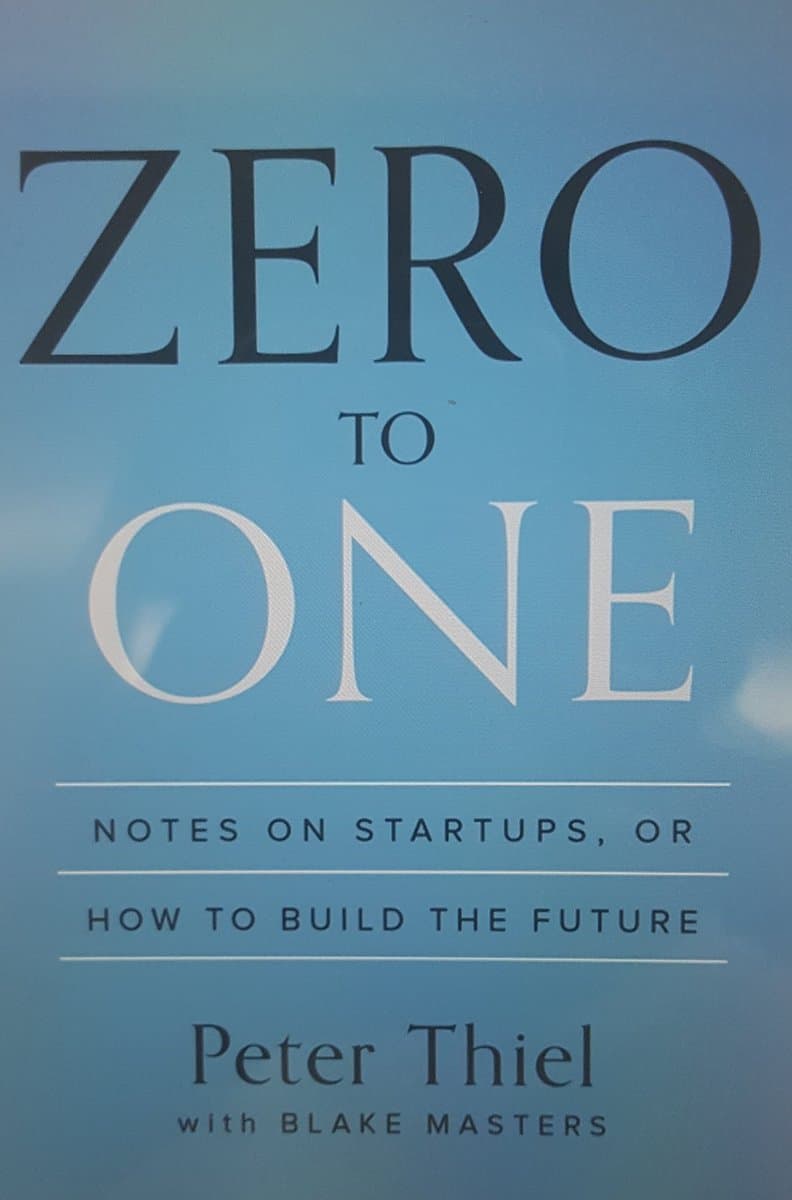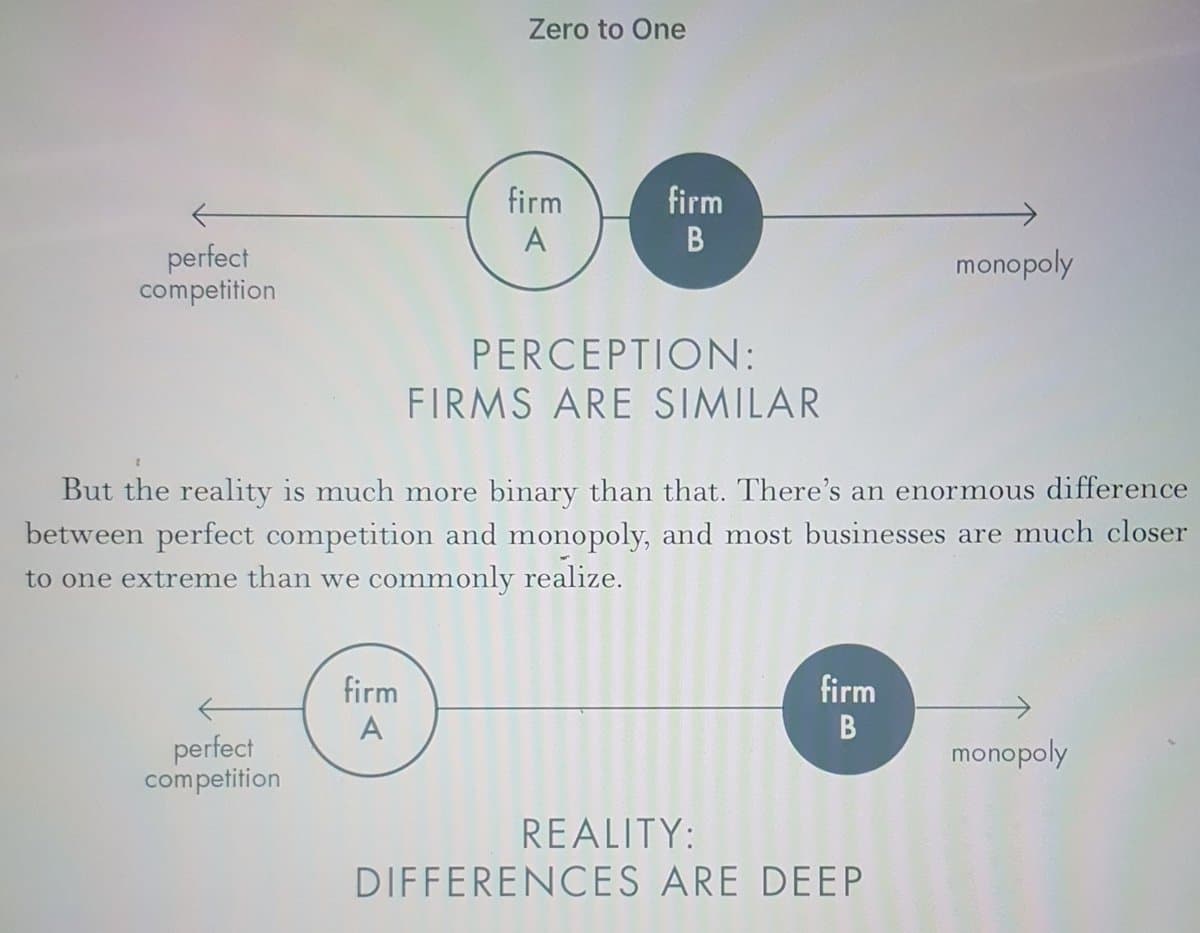🧵 View Thread
🧵 Thread (37 tweets)

#nowreading Zero To One, Peter Thiel https://t.co/zRXJwkuTnc


What important truth do very few people agree with you on? 3 bad egs: Education is broken America is exceptional There is no God People already agree with 1 and 2, and 3 is just taking a side in a familiar debate What is Thiel's uncommon belief?

Thiel asserts that most people think globalization will define the future, but he thinks tech matters more New tech is neither automatic nor guaranteed We need to imagine and create new technologies for more peace&prosperity

New tech tends to come from new ventures, aka startups Startups straddle the balance between solo genius (great work but not industry-creating) and bureaucratic hierarchies (minimize risk, move slowly) Work with others + move stay small

Thiel spends some time explaining the dotcom bubble and the reaction to its bursting. People became fearful and overcompensated in revising their principles about what's good, what works. Incremental vs big vision Lean vs planned Existing vs new customers Product vs sales

Big business can be bad business Airline industry worth hundreds of billions But in 2012 each airline made ~$0.37 per passenger trip Google brought in less revenue ($50B) but kept 21% for itself- over 100x airline profit margin Google now worth 3x all US airlines combined

To an economist, every monopoly looks the same 0 to 1 focuses on monopoly-of-ability rather than license-based or rival-eliminating monopolies (can they really be so neatly distinguished? 🤔) Capitalism = accumulation of capital Competition = profits get competed away

It's hard to tell how much of the world is truly competitive vs truly monopolistic because common conversation is so confused Everyone is incentivized to lie https://t.co/NJYECmtr78


Monopolists avoid bragging because it invites scrutiny, audits, attack. Rather, they conceal their monopoly- usually by exaggerating the power of their nonexistent competitors. Google frames itself as a small player in a big advertising market rather than a big player in search

Non-monopolists tell the opposite lie - "we're in a league of our own". Eg selling British food in Palo Alto "No one's doing it, we'll own the whole market" But what if the relevant market is really all restaurants? People rarely consider this when evaluating their failure

“Monopolists can afford to think about things other than making money, non-monopolists can’t.” “In a static world, a monopolist is just a rent-collector. But we live in a dynamic world: it’s possible to invent new and better things.” Hence patents to new inventions.

“The dynamism of new monopolies itself explains why old monopolies don’t strange innovation.” “The promise of years or even decades of monopoly profits” So why is competition so idealized? Thiel argues that it’s a sort of physics envy– seeing businesses as interchangeable atoms

Thiel spends some time talking about the silliness of students competing for a narrow set of prizes – his route was through Stanford Law. He didn’t get the Supreme Court clerkship – and on retrospect it freed him to do PayPal. (I’m reminded of Da Vinci almost becoming a notary)

He also suggests that people with Aspergers-like dispositions have an advantage, because they’re less sensitive to social cues and less likely to get caught up in competing with their peers. “Winning is better than losing, but everyone loses when the war isn’t worth fighting.”

In ‘01, PayPal had no profits, but revenue was growing 100% YoY. They projected 75% of the company’s value would come after 2011. That was an underestimate: with 15% YoY growth, most of PayPal’s value will be created after 2020. Thiel says same will be true for LinkedIn

For a tech co to be valuable it must grow & *endure*. Many entrepreneurs focus on the former but not the latter. Growth is easy to measure, durability isn’t. You can hit your weekly growth stats while overlooking deeper, harder-to-measure problems that threaten biz durability

Thiel uses Zynga & Groupon as egs of businesses that grew fast w/o adequately addressing longer-term, structural issues (getting loyalty from fickle, bargain-hunting customers). #’s alone can’t tell you if your biz will survive 10yrs – must think critically abt qualitative bits

2. Network effects. If the value of your product increases with more users, having the most users means the 2nd-best product isn’t worth using. A hitch: Your product has to be useful to some small niche first. If it needs everyone to use it before it’s useful, nobody will use it.

3. Economies of scale. Software companies enjoy this because the cost of producing and selling another copy is close to zero. Thiel argues that Twitter, for eg, should be able to keep growing without making any significant product changes.

4. Branding. Apple is the standard. Complex suite of proprietary tech (touchscreen materials, interfaces). It manufactures products at scale, getting good deals on raw materials. Its content ecosystem enjoys network effects (devs develop for Apple because the users are there).

But you can’t start with brand if you don’t have the substance underlying it. Yahoo tried to be cool – but they haven’t really made anything compelling. When Jobs returned to Apple, he slashed product lines to focus on 10x-ing a handful of products.

Every startup starts small. Every monopoly dominates a large share of its market. So every startup should start with a very small market. But there has to be _some_ market. PayPal’s first mistake was targeting PalmPilot users – they weren’t concentrated and didn’t need payments

Red flag: when an entrepreneur talks about getting 1% of a $100B market. A large market will either be open to competition or lack a good starting point – and if you get a small foothold, you’ll struggle to keep the lights on because of cutthroat competition.

The problem with ‘disruption’ – it distorts entrepreneurial self-understanding. If you think of yourself as an insurgent battling dark forces, it’s easy to get overly fixated on obstacles in your path, and the ‘head on’ battle will likely exhaust/drain you.

Napster took on the record industry directly – cover of TIME magazine one year, in bankruptcy court the next. In contrast, while PayPal took some business away from VISA, they expanded the market for payments overall and gave them more business than they took.

“Every one of today’s famous, familiar ideas was once unknown and unsuspected. [...] If you wanted in on Pythagoras’s discovery of the mathematical relationship between a triangle’s sides, joining his strange vegetarian cult was the best way to learn about it.” 😂

The Unabomber argued that people are depressed because all the world’s hard problems are already solved – so what’s left is either too easy or impossible, both of which are unsatisfying. “If everything worth doing has already been done, [...] you may as well become a barista.”

Why do people seem convinced there are no secrets left to discover? - no blank spaces left on the map - incrementalism, taught to kids and also why “publish or perish” - risk-aversion – people want to be not-wrong more than they want to be interesting - complacency -homogeneity